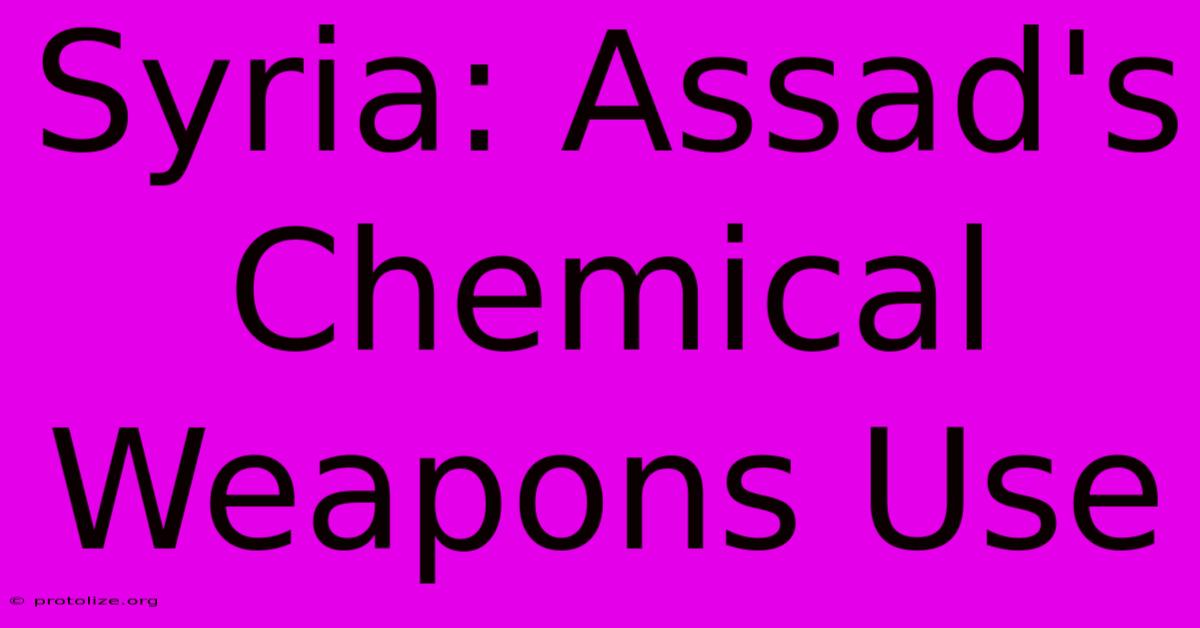Syria: Assad's Chemical Weapons Use

Discover more detailed and exciting information on our website. Click the link below to start your adventure: Visit Best Website mr.cleine.com. Don't miss out!
Table of Contents
Syria: Assad's Chemical Weapons Use: A Legacy of Horror and International Condemnation
Syria's ongoing civil war, which began in 2011, has been marred by horrific atrocities, with the use of chemical weapons by the Assad regime being among the most egregious. This article explores the documented instances of chemical weapons use, the international response, and the lasting impact on the Syrian people.
Documented Instances of Chemical Weapons Use
The Assad regime stands accused of numerous chemical weapons attacks throughout the conflict, targeting civilian populations in rebel-held areas. While definitive proof can be difficult to obtain amidst the chaos of war, numerous reports from international organizations like the Organization for the Prohibition of Chemical Weapons (OPCW), along with eyewitness testimonies and independent investigations, paint a disturbing picture.
Notable Attacks:
-
Ghouta (2013): This attack, considered one of the deadliest, involved the use of sarin gas, killing hundreds of civilians. The attack sparked international outrage and brought the issue of chemical weapons use in Syria to the forefront of global attention.
-
Khan Sheikhoun (2017): Another devastating attack using sarin gas, Khan Sheikhoun resulted in dozens of civilian deaths, including many children. The attack was widely condemned internationally, leading to increased pressure on the Assad regime.
-
Eastern Ghouta (2018): Multiple attacks using chlorine gas were reported in Eastern Ghouta during the government offensive. The OPCW investigation confirmed the use of chlorine as a weapon, further solidifying the evidence against the Assad regime.
These are just a few examples of the many alleged chemical weapons attacks carried out during the Syrian civil war. The sheer scale and brutality of these attacks highlight the disregard for human life shown by the Assad regime.
The International Response: A Complex and Often Ineffective System
The international community's response to Assad's chemical weapons use has been complex and, arguably, ineffective. While the use of chemical weapons is a violation of international law and is unequivocally condemned, strong and decisive action has been lacking.
Challenges in Responding:
-
Political gridlock: The Syrian conflict has become entangled in a complex web of geopolitical interests, hindering unified international action. Differing national priorities and alliances have often paralyzed efforts to hold Assad accountable.
-
Verification and attribution: Determining responsibility for chemical weapons attacks amidst the chaos of war is incredibly challenging. While the OPCW plays a vital role in investigation, attributing responsibility definitively can be difficult.
-
Lack of enforcement: Even with clear evidence of chemical weapons use, enforcing international law and holding perpetrators accountable has proven extremely difficult. The international community's reluctance to intervene militarily has limited its options.
The Lasting Impact: A Human Tragedy of Immense Proportions
The use of chemical weapons in Syria has had a devastating impact on the Syrian people, leaving behind a legacy of suffering and trauma. Beyond the immediate casualties, the long-term health consequences for survivors are severe, often leading to chronic respiratory illnesses and neurological disorders. The psychological trauma inflicted on survivors and witnesses is equally profound. The use of chemical weapons also contributes to the ongoing displacement and humanitarian crisis in Syria.
Conclusion: Accountability and Prevention
The continued use of chemical weapons in Syria demands a renewed commitment from the international community to hold the Assad regime accountable for its actions. Effective mechanisms for investigation, attribution, and enforcement of international law are crucial. Preventing future attacks requires a multifaceted approach, including stronger international cooperation, stricter monitoring, and addressing the underlying causes of the conflict. The suffering of the Syrian people underscores the urgent need for a peaceful resolution and an end to the impunity enjoyed by those who resort to such barbaric tactics. The world cannot stand idly by while such atrocities continue.

Thank you for visiting our website wich cover about Syria: Assad's Chemical Weapons Use. We hope the information provided has been useful to you. Feel free to contact us if you have any questions or need further assistance. See you next time and dont miss to bookmark.
Featured Posts
-
Dan Ashworth Leaves Man Utd Sporting Director Role
Dec 09, 2024
-
Crm Tracking
Dec 09, 2024
-
Creating A Crm
Dec 09, 2024
-
Fury Erupts After Ufc Main Event Choke
Dec 09, 2024
-
Labour Policies Hitting High Street Businesses
Dec 09, 2024
